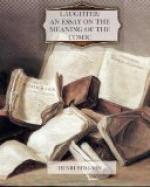this kind of wit, instances of which could easily
be multiplied. The
reciprocal interference
of two sets of ideas in the same sentence is an inexhaustible
source of amusing varieties. There are many ways
of bringing about this interference, I mean of bracketing
in the same expression two independent meanings that
apparently tally. The least reputable of these
ways is the pun. In the pun, the same sentence
appears to offer two independent meanings, but it
is only an appearance; in reality there are two different
sentences made up of different words, but claiming
to be one and the same because both have the same
sound. We pass from the pun, by imperceptible
stages, to the true play upon words. Here there
is really one and the same sentence through which
two different sets of ideas are expressed, and we are
confronted with only one series of words; but advantage
is taken of the different meanings a word may have,
especially when used figuratively instead of literally.
So that in fact there is often only a slight difference
between the play upon words on the one hand, and a
poetic metaphor or an illuminating comparison on the
other. Whereas an illuminating comparison and
a striking image always seem to reveal the close harmony
that exists between language and nature, regarded
as two parallel forms of life, the play upon words
makes us think somehow of a negligence on the part
of language, which, for the time being, seems to have
forgotten its real function and now claims to accommodate
things to itself instead of accommodating itself to
things. And so the play upon words always betrays
a momentary
lapse of attention in language,
and it is precisely on that account that it is amusing.
Inversion and reciprocal interference,
after all, are only a certain playfulness of the mind
which ends at playing upon words. The comic in
transposition is much more far-reaching.
Indeed, transposition is to ordinary language what
repetition is to comedy.
We said that repetition is the favourite method of
classic comedy. It consists in so arranging events
that a scene is reproduced either between the same
characters under fresh circumstances or between fresh
characters under the same circumstances. Thus
we have, repeated by lackeys in less dignified language,
a scene already played by their masters. Now,
imagine ideas expressed in suitable style and thus
placed in the setting of their natural environment.
If you think of some arrangement whereby they are transferred
to fresh surroundings, while maintaining their mutual
relations, or, in other words, if you can induce them
to express themselves in an altogether different style
and to transpose themselves into another key, you
will have language itself playing a comedy—language
itself made comic. There will be no need, moreover,
actually to set before us both expressions of the
same ideas, the transposed expression and the natural




